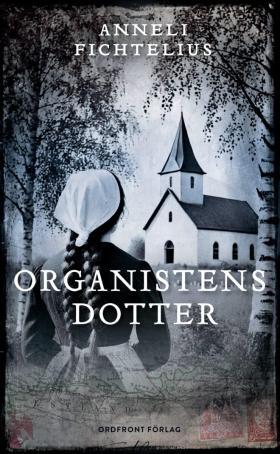
Organistens dotter
(The Organist’s Daughter)
by Anneli Fichtelius
reviewed by Michael O. Jones
Organistens dotter (The Organist’s Daughter) is very much like Downton Abbey, if that show were set in 1870s Swedish-speaking Estonia and focussed on tenants and farmers rather than the landed gentry. In a multiethnic Tsarist Estonia whose independence was a barely even a dream, young Tio Pelmas aspires to escape the life expected of her to become a teacher, but events do not go as anybody planned.
Organistens dotter is a work of historical fiction which tells the story of Estonian Swede Tio Pelmas, a daughter of the parish organ player. Tio strains against the expectations her parents place on her and dreams of studying to become a teacher rather than a farmer's wife and a mother. Her prospects change in unforeseen ways when the local dowager baroness takes a liking to her and hires her as a maid at the manor. However, the dowager baroness’s interest in Tio is no mere whim, and the young baron’s interest in Tio is, alas, far from innocent.
The stand-out aspect of this novel was the historical research and the author bringing to life a people and place which has all but passed from memory. Having lived on the coast of western Estonia for at least 800 years, the Estonian Swedes were once as much part of Estonia as the Finland-Swedish minority is in Finland, albeit smaller. But most of the country’s ancient minority of roughly 10,000 Estonian Swedes fled the country for Sweden ahead of the Soviet invasion of 1944. The protagonist Tio is in large part inspired by the author’s own great-grandmother who fled to Sweden on the ship Odin in December 1944. The locations in the novel are the author’s own ancestral homes, towns, and farmsteads, which too frequently have fallen to rubble like the Estonia-Swedish culture itself. But memories of their songs and lives are brought to life in the pages of this book, with even the exile of hundreds of Estonian Swedes to Ukraine a century previously being evoked.
However, the story is not what I expected based on the blurb or the opening of the novel. The promised backdrop of ethnic tensions and Russification in the Russian Empire scarcely plays a role, meaning that the historical novel I thought I was going to read felt much more like a family saga with bits of history here and there. The story was not bad, but not what I wanted to read when I picked up the book.
The plot is generally light and entertaining and served in large part to bring the lost world of Estonian Swedes to life with their festivals, traditions, and history. Family secrets kept buried for decades form the backbone of the story, with Tio actually being a close but ‘illegitimate’ relative of the dowager baroness through her father. Even though Tio eventually gets to leave rural Swedish Estonia behind for Reval (now Tallinn) and has the opportunity to become a teacher, it is no rags-to-riches fairytale, as Tio's departure is precipitated by traumatic events.
Which leads to something which left me scratching my head: why are the majority of men in this story repulsive? Drunks, child beaters, wife beaters, groomers, rapists, emotionally stunted and distant fathers... Those men existed, but given the diverse nature of the women and girls presented in the novel, the preponderance of bad men is noteworthy.
Altogether an entertaining novel dealing with a part of history most people will never hear anything about, I appreciated the author’s saving a part of her own and Estonia's heritage for people like me who take an interest in such things. In spite of this book not having been what I expected, I look forward to reading part two of the series when it is released this autumn.

Organistens dotter
Ordfront förlag, 2024, 374 pages
Foreign Rights: contact the publisher
Anneli Fichtelius is a Swedish author and communicator for Save the Children. Organistens dotter (The Organist’s Daughter) is her fourth published novel and the first in a trilogy of historical novels about Estonia Swedes. The second book in the series, Redarens hustru (The Shipowner’s Wife, 2025) is to be released this autumn, and the series will conclude with Patriotens mor (The Patriot’s Mother). Other works include Att fejka en bestseller (Faking a Bestseller, 2022) and Priset (The Cost, 2020).
